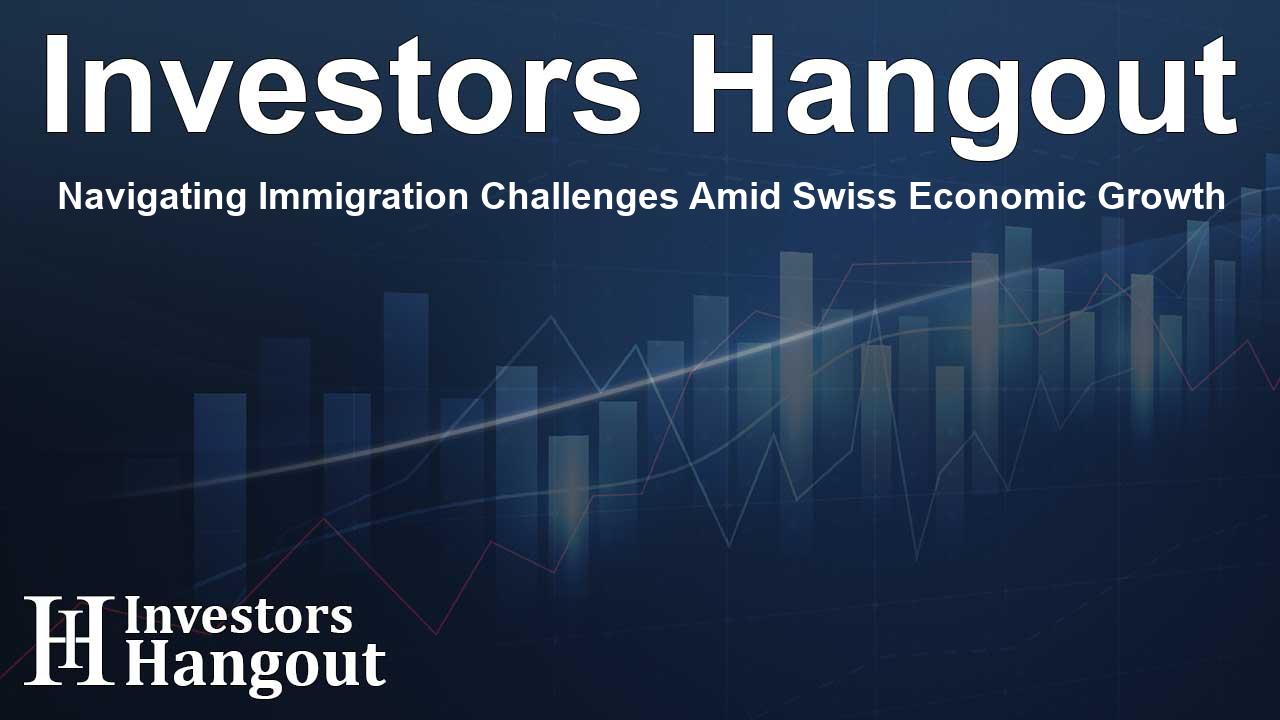Navigating Immigration Challenges Amid Swiss Economic Growth

Switzerland's Economic Boom and Immigration Concerns
As Switzerland experiences a remarkable jobs boom, fueled by its low-tax business environment, the nation grapples with the implications of rising immigration from the European Union. The current situation is posing a challenge, pushing the Swiss government to reevaluate its stance on the delicate balance of immigration and economic growth.
Trade Negotiations and Political Implications
Recent negotiations between Switzerland and the EU highlighted the tension surrounding immigration. Talks intended to modernize the regulations governing approximately 300 billion Swiss francs in annual trade were previously stalled in 2021 due to these immigration disputes. With negotiations having resumed, the stakes are high as Switzerland aspires to navigate these waters delicately.
Calls for a Protection Clause
In response to rising nationalist sentiments, Swiss lawmakers advocate for the introduction of a 'protection clause' within the EU trade agreement. This initiative aims to afford Switzerland greater autonomy over immigration policies, which they see as pivotal to preserving the well-being of Swiss society and its thriving economy.
Population Growth Trends
Since gaining unrestricted access to the EU's single market in 1999, Switzerland’s economy has outperformed those of its neighbors like Germany and France. A notable aspect of this growth is the country’s population explosion, which grew from 7 million in 1995 to over 9 million today. This remarkable surge raises concerns over infrastructure and housing, compounding the debate over immigration.
Economic Advantages and Workforce Dependence
The reliance on immigration to sustain economic growth has become a critical issue. Approximately 27% of the Swiss population is foreign-born, significantly higher than the average in European nations. This dependence has attracted companies eager to exploit the favorable tax rates. As companies relocate to Switzerland for its low corporate taxes—averaging 19.7% in 2023, lower than those in surrounding countries—the need for workers continues to escalate.
The Corporate Landscape in Switzerland
Switzerland enjoys a robust landscape filled with global corporate titans such as Nestle, Roche, and Glencore, making it home to around three times as many Fortune Global 500 companies per capita as the United States. This impressive corporate presence consistently demands a skilled workforce, necessitating a steady flow of immigrants. However, if immigration restrictions become too burdensome, companies may seek options elsewhere, threatening local job security.
Future Prospects of Swiss Manufacturing
The uncertainty surrounding future trade agreements only adds to the complexity of the current situation. Questions regarding workforce availability have prompted some firms to begin expansion plans outside of Switzerland. For instance, Ypsomed, a medical technology company, is investing significantly in new facilities, with the majority of projects located outside of Switzerland. The CEO, Simon Michel, has voiced concerns over the practical implications of hiring restrictions on local manufacturing.
Impact on the Medical Technology Sector
Switzerland’s medtech industry faces unique challenges due to outdated regulations cutting access to the EU market. The expiration of mutual recognition agreements in 2021 has resulted in additional hurdles for Swiss companies needing to navigate the bureaucratic landscape to sell products in the European market. Firms must re-register products, leading to significant expenditures and further complicating the market landscape.
The Path Forward
As Switzerland continues to negotiate its trade relationship with the EU, the balancing act between immigration control and economic stability will remain critical. With potential changes looming on the horizon, the Swiss government must find solutions that address the concerns of its citizens while safeguarding the country's economic interests. Only then can Switzerland hope to maintain its status as a hub for international business.
Frequently Asked Questions
What is driving Switzerland's current immigration debate?
The surge in job opportunities fueled by a strong economy has led to increased immigration, raising concerns about population growth and its impact on Swiss infrastructure.
How does the immigration situation affect EU trade talks?
Immigration concerns have previously stalled trade negotiations and continue to be a contentious point during ongoing discussions with the EU.
What percentage of Switzerland’s population is foreign-born?
Currently, approximately 27% of Switzerland's population consists of foreign nationals, significantly above the EU average.
How do corporate taxes in Switzerland compare to other EU countries?
Switzerland boasts a lower average corporate tax rate of 19.7% compared to surrounding EU nations, making it an attractive destination for businesses.
What are the implications for companies if immigration restrictions are enacted?
If restrictions are put in place, companies may struggle to hire locally, potentially leading to job relocations and expansions outside of Switzerland, altering the local economic landscape.
About Investors Hangout
Investors Hangout is a leading online stock forum for financial discussion and learning, offering a wide range of free tools and resources. It draws in traders of all levels, who exchange market knowledge, investigate trading tactics, and keep an eye on industry developments in real time. Featuring financial articles, stock message boards, quotes, charts, company profiles, and live news updates. Through cooperative learning and a wealth of informational resources, it helps users from novices creating their first portfolios to experts honing their techniques. Join Investors Hangout today: https://investorshangout.com/
Disclaimer: The content of this article is solely for general informational purposes only; it does not represent legal, financial, or investment advice. Investors Hangout does not offer financial advice; the author is not a licensed financial advisor. Consult a qualified advisor before making any financial or investment decisions based on this article. The author's interpretation of publicly available data shapes the opinions presented here; as a result, they should not be taken as advice to purchase, sell, or hold any securities mentioned or any other investments. The author does not guarantee the accuracy, completeness, or timeliness of any material, providing it "as is." Information and market conditions may change; past performance is not indicative of future outcomes. If any of the material offered here is inaccurate, please contact us for corrections.